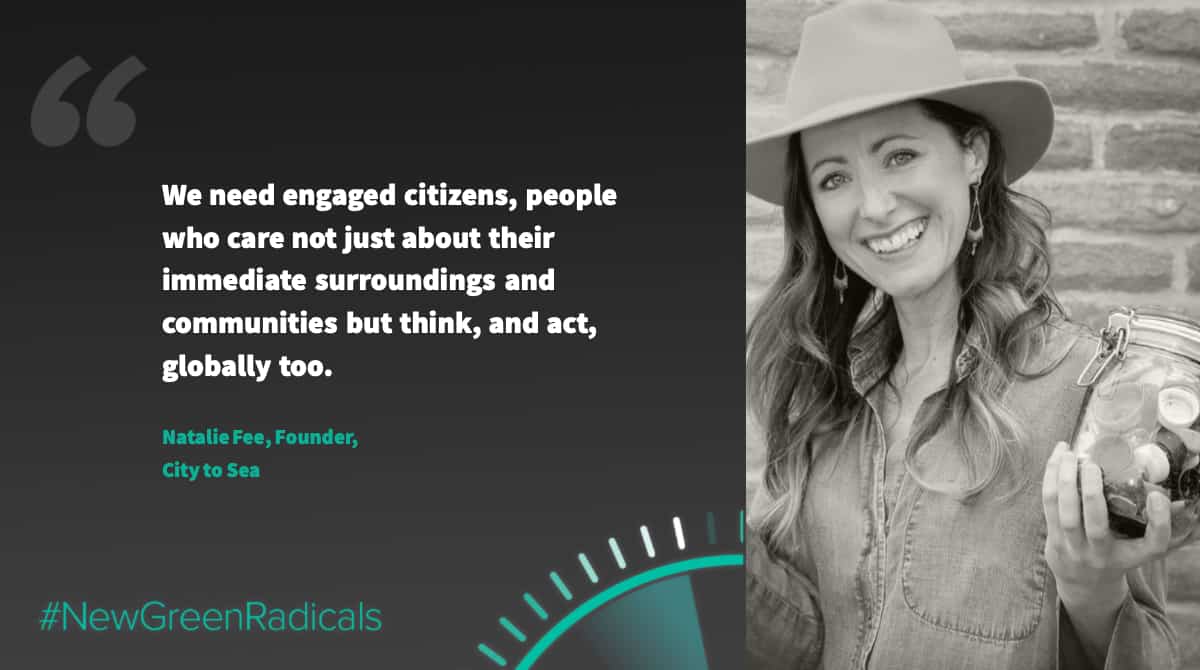New Green Radicals: Natalie Fee
Do you think it’s important we respond to the climate emergency?
Of course – the future of life on earth depends on it. We’ve lost half the world’s wildlife in my lifetime and I think we should all be doing everything we can to ensure the other half doesn’t go the same way in the next 40 years.
Why do you think we need green radicals at a time like this?
I believe we need engaged citizens, people who care not just about their immediate surroundings and communities but think, and act, globally too. The clock is ticking in terms of climate breakdown, biodiversity loss, soil degradation and ocean acidification – so we need everybody, now, to do their bit.
I suppose the role of the ‘green radicals’, or perhaps ‘green pioneers’ is a less scary label, is to show that there’s a better way and it’s way more fun.
How would you define a green radical?
I think the term radical has negative connotations. So I’d maybe call them, or us, green pioneers or green leaders. A pioneer is someone who goes bravely where others haven’t, covers new ground, tries new things… and reports back on what works and hopefully gets others to join in.
Do we need to redefine markets?
We probably still need to take a bigger step back and redefine growth. Redefining markets to me requires an admission that finite growth isn’t a good thing, which kind of flies in the face of capitalism. For anyone that’s not read Doughnut Economics by Kate Raworth, I recommend it. That said, perhaps infinite growth from renewables is possible – but businesses and products that rely on extracting non-renewable resources such as fossil fuels and minerals are going to have to transition, fast.
Do you regard yourself/your organisation as a green radical?
I regard myself as a bit of a megaphone for nature, amplifying messages that resonate with me and have changed my life for the better.
City to Sea took that a step further by not just sharing messages, but actually changing the status quo by running campaigns and effecting system change as well as individual change.
How has your organisation taken a radical approach to environmental action?
As a campaigning organisation, environmental action is embedded into everything we do. I don’t think saving the planet is radical – it’s common sense. In terms of our approach, we’ve generally gone for change in the places we felt we could have most influence, so with retailers for example, as is the case with our ‘Switch the Stick’ campaign whereby we persuaded all major UK supermarkets to switch from plastic to paper cotton buds. People-power definitely works. We’ve also given our team two paid volunteer days a year, in case they want to go and support another good cause.

How do you build the business case for radical change?
It’s pretty black and white to me. No bees, no food. No forests, no air. No oceans, no life. No future, no business.
I’m not a doomsayer, but I think it’s farcical to think we can carry on with business as usual and keep prioritising profit over planet. It’s not working out for the masses, and the masses are clocking on and starting to hold business, and government, to account.
So I’d say if you want to keep your customers, or clients, and attract more, you need to be radical in your approach. Kill off the parts of your business that are planet-destroying and invest in the ones that are sustainable, or at the very least, carbon-neutral.
What’s the biggest barrier to you making change?
We’ve grown from zero to 34 staff in three years, which is amazing, but for us more funding and corporate partnerships will always mean we can deliver more impact in our campaigns.
How have customers, employees and stakeholders responded?
Our staff are happy, our stakeholders and partners are proud of what they’re enabling, and our members and volunteers are engaged with our campaigns. So I think doing the right thing by the planet works for us.
How do you inspire others to radicalism?
My personal motto, which I go into in more detail in my new book, is that “there’s a better way that’s way more fun”. So we show people that the sustainable, regenerative way of doing things isn’t actually a sacrifice, but it feels better than what you were doing before.
What’s the secret to taking a radical idea mainstream?
We use tried and tested behaviour change techniques in our campaigns at City to Sea. Creating new narratives, new norms and making it fun.
Which area of the economy do you think is most in need of radical change?
Energy, transport and agriculture. But we need the government to support the changes we need.
If the government stopped subsidising fossil fuels, we’d have around £10.5 billion a year to subsidise rail travel and the transition to organic farming.
What’s the most radical thing you’ve ever done?
Taken my clothes off in Bristol Airport for some guerrilla filmmaking for City to Sea’s plastic-free travel campaign.
